Marriage customs in Dubai
Marriage customs in Dubai reflect the rich culture and deep-rooted traditions of its people, shaped over centuries and now intertwined with elements of modernity. In the opening paragraph of this article, we explore the marriage customs in Dubai—traditions that not only reflect the ethnic and religious identity of the Emirati people but also highlight the importance of family, mutual respect, and social bonds.
Marriage in Emirati culture is considered one of the most significant life events and is celebrated with special ceremonies. It typically begins with a formal proposal, where the groom’s family visits the bride’s family to discuss marriage terms, dowry, and other details. Once both families agree, the engagement is followed by the marriage contract and then the wedding celebration, which can last for several days.
In Dubai, it is common to wear traditional attire during weddings—the “abaya” for women and the “kandura” for men. Traditional Emirati music, local dances such as the “Ayala”, and lavish feasts featuring regional dishes are also key parts of the wedding. Although modern lifestyles have simplified some aspects of these ceremonies, many families remain committed to preserving their authentic traditions.
In this article, we aim to introduce you to the different stages of marriage in Dubai, specific family customs, the role of Islam in these ceremonies, and the modern changes influencing the way weddings are held today.
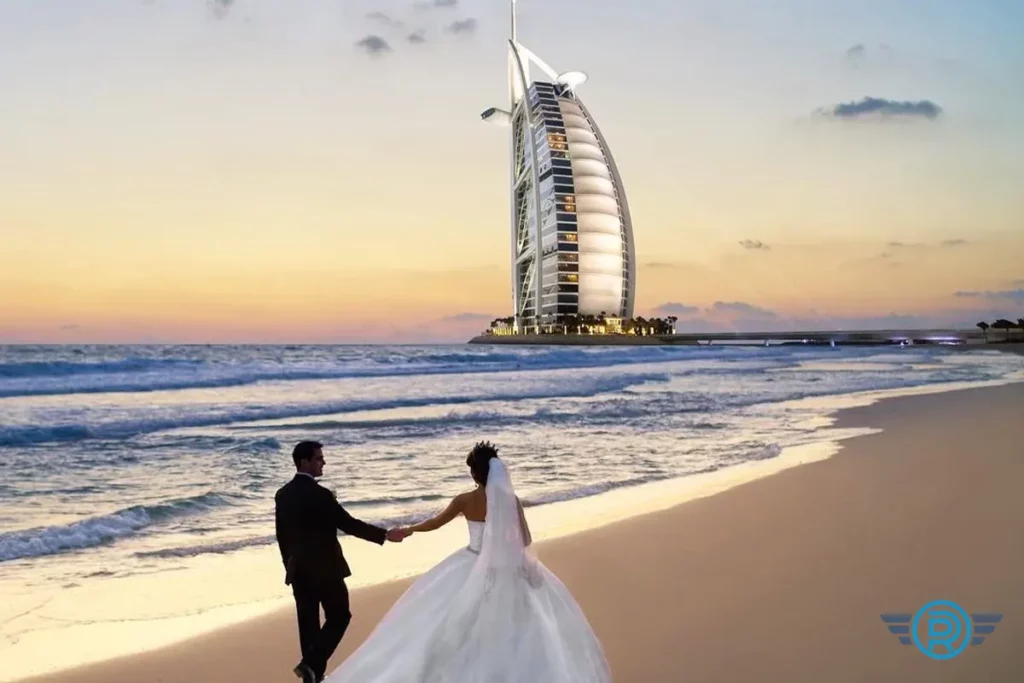
The importance of marriage in UAE culture
In the culture of the United Arab Emirates, marriage is not only a union between two individuals but also a deep connection between two families. This event plays a key role in maintaining social cohesion and reinforcing cultural values. Traditionally, Emirati families have viewed marriage as a means of continuing lineage, strengthening social standing, and preserving ethnic identity. Therefore, holding the wedding ceremony with close adherence to traditional customs holds great significance in society.
Marriage customs in the UAE consist of a series of traditions and rituals that have been passed down through generations. The engagement typically begins with a proposal attended by senior family members. Once both parties agree, the engagement phase officially begins. One of the most important customs is the payment of a dowry, which symbolizes the groom’s respect toward the bride’s family. Additionally, pre-wedding celebrations such as the “Henna Night” feature traditional music, dances, and the intricate application of henna designs on the bride’s hands—beautiful expressions of Emirati culture.
The main wedding ceremony is often held with grandeur in luxurious halls. Men and women usually celebrate separately and wear traditional Arabic attire, such as the abaya for women and the kandura for men. Serving local dishes—especially rice and meat—is a key part of the celebration.
Emirati culture strives to preserve the authenticity of its marriage customs, even though in recent years, some families have embraced a blend of tradition and modernity. Nonetheless, respect for elders, strong family ties, and adherence to rituals remain priorities and continue to play an essential role in strengthening the family unit.
If you’re looking to rent a luxury, economy, or family car in Dubai, Diar Rent is a smart choice for you.
Traditional steps of marriage in Dubai
Marriage in Dubai, like in other parts of the United Arab Emirates, is a traditional and deeply rooted process accompanied by a series of specific rituals and ceremonies. These stages begin even before the official proposal and continue after the wedding celebration. Despite the influence of modernity, marriage customs in this city still retain their value and status, and families strive to honor this important occasion with deep respect for tradition.
1. Searching for a Suitable Partner
In Dubai, families play a fundamental role in finding a suitable spouse for their children. Often, the groom’s mother or sister selects a girl from relatives or acquaintances who is known for good character, strong family background, and commitment to traditions.
2. Formal Proposal (Al-Khitbah)
After identifying the desired bride, the groom’s family, accompanied by senior relatives, visits the bride’s home for an official proposal. During this meeting, they discuss the terms of marriage, dowry, wedding date, and other matters. This ceremony is typically held in a warm, respectful atmosphere.
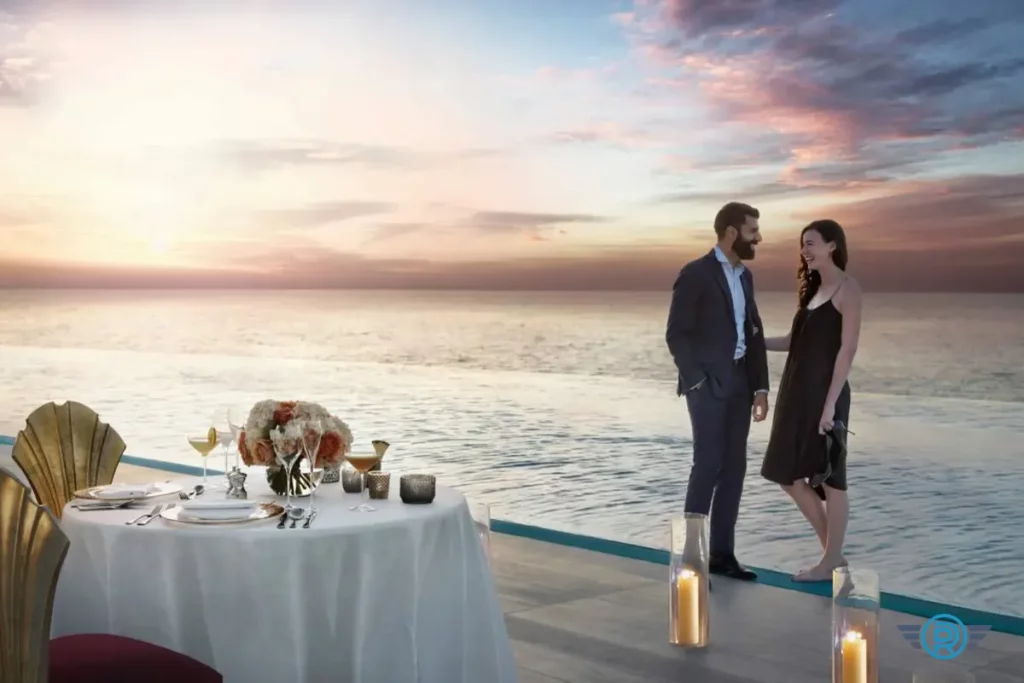
3. Islamic Marriage Contract (Aqd Al-Nikah)
Once both families agree, the formal Islamic marriage contract takes place. Conducted by a sheikh or religious judge, this step officially binds the couple as husband and wife. The dowry is recorded, and two witnesses must be present.
4. Henna Night (Laylat Al-Henna)
One of the most colorful and beautiful traditions of marriage in Dubai is the Henna Night. This event is dedicated to the bride and usually attended by the women in her family and friends. Henna is artistically applied to the bride’s hands and feet, accompanied by traditional music and dancing, creating a joyful atmosphere.
5. Wedding Celebration (Al-‘Urs)
The main wedding celebration takes place in a hall or large family home. Men and women celebrate separately. The bride wears a traditional or modern white dress, while the groom typically wears a white kandura and ghutra. Guests are treated to local dishes such as majboos, biryani, and camel meat.
6. Bride’s Entrance into the Groom’s Home (Al-Dukhla)
After the wedding, the groom’s family brings the bride to her new home. In the past, this was done with special rituals, including burning incense and reciting prayers for blessings. Today, families still seek to preserve this tradition with respect and ceremony.
The impact of modernity on marriage customs in Dubai
In recent years, Dubai—recognized as one of the most advanced and cosmopolitan cities in the Middle East—has witnessed significant changes in lifestyle and social culture. One of the key areas affected by these transformations is marriage customs. With the advent of technology, the rise of social media, and increased interaction with diverse cultures, the wedding process in Dubai has taken on a new and modern flavor.
Changes in Courtship and Introductions
Traditionally, proposals were arranged in a formal manner with direct involvement from the families. Nowadays, many young people in Dubai meet through university, the workplace, or even social media. Although this type of pre-marriage interaction is still considered sensitive in some families, it is gradually becoming more accepted.
Engagement and Wedding Ceremonies with a Modern Theme
In the past, engagement and wedding ceremonies were conducted strictly according to Arab and Islamic traditions. Today, many young couples prefer modern-themed events featuring professional lighting, elegant decorations, and even international styles. In some celebrations, Western live music or DJ performances have replaced traditional music.
Bride and Groom Attire
Previously, brides in Dubai typically wore traditional Arabic dresses such as the abaya or local garments. Now, many brides lean towards modern European-style gowns. Grooms, aside from the traditional kandura, may opt for formal suits, especially at more upscale or formal events.
Impact of Social Media
One of the most striking influences of modernity on wedding traditions is the extensive use of social media in planning and executing the event. Couples often turn to these platforms for inspiration regarding décor, attire, makeup styles, and even venue selection. In some cases, weddings are livestreamed—something unimaginable in the past.
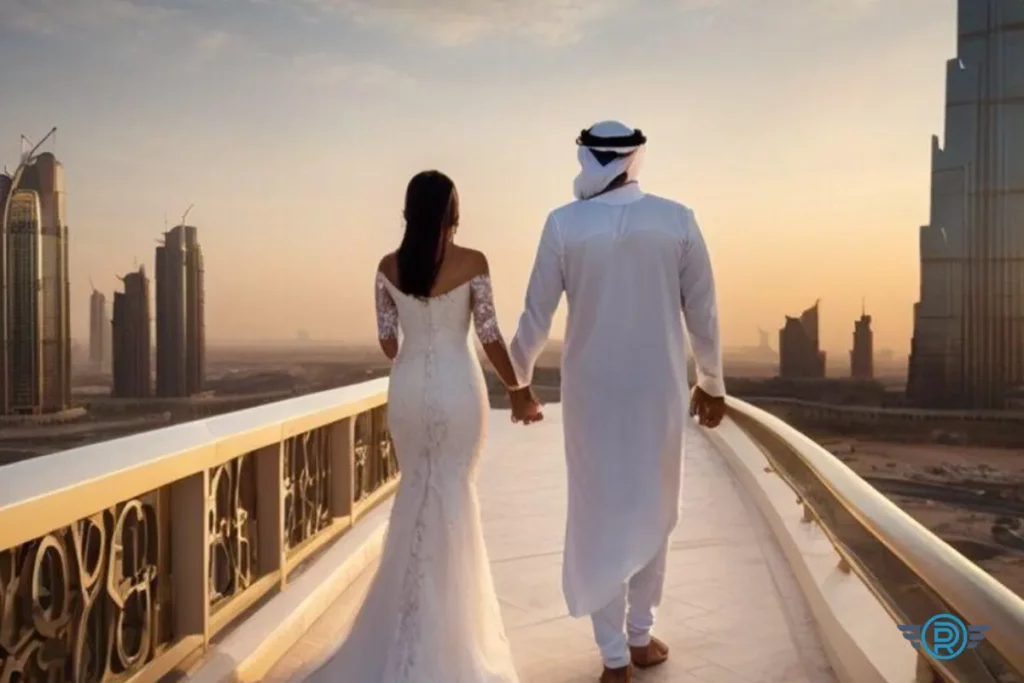
Balancing Tradition and Innovation
Despite these changes, many Emirati families in Dubai strive to maintain a balance between tradition and modernity. For instance, they may conduct the engagement ceremony in a traditional way while choosing a more modern style for the wedding celebration. Traditional rituals such as the Henna Night, dowry payment, and the bride’s entry into the groom’s home are still honored, even if their appearance or presentation has evolved.
Traditional clothing at Emirati weddings
Traditional clothing plays a significant and vibrant role in Emirati wedding customs. These garments not only reflect the beauty and elegance of the local culture but also symbolize a deep respect for long-standing traditions. Both the bride and groom wear special, symbolic outfits rooted in Arab heritage, and guests also typically dress in traditional attire.
Bridal Attire
In the past, Emirati brides wore traditional Arabic dresses made of silk or chiffon, richly decorated with golden or silver embroidery. One of the main garments was the “thoub” or “embroidered kandura,” adorned with local patterns and heavy jewelry. These dresses often came in rich colors such as gold, emerald green, or red.
During the Henna Night, the bride typically wears a dress called “Mukhawara” or “Thoub al-Henna,” usually in green or burgundy, complemented by henna designs and traditional jewelry. These garments not only showcase beauty but also convey cultural messages of blessing, joy, and the beginning of a shared life.
Nowadays, in addition to traditional wear, many brides choose a modern white wedding gown similar to Western styles for the main ceremony. However, traditional Arabic jewelry, including heavy necklaces, gold bangles, and ornate crowns, still remains popular.
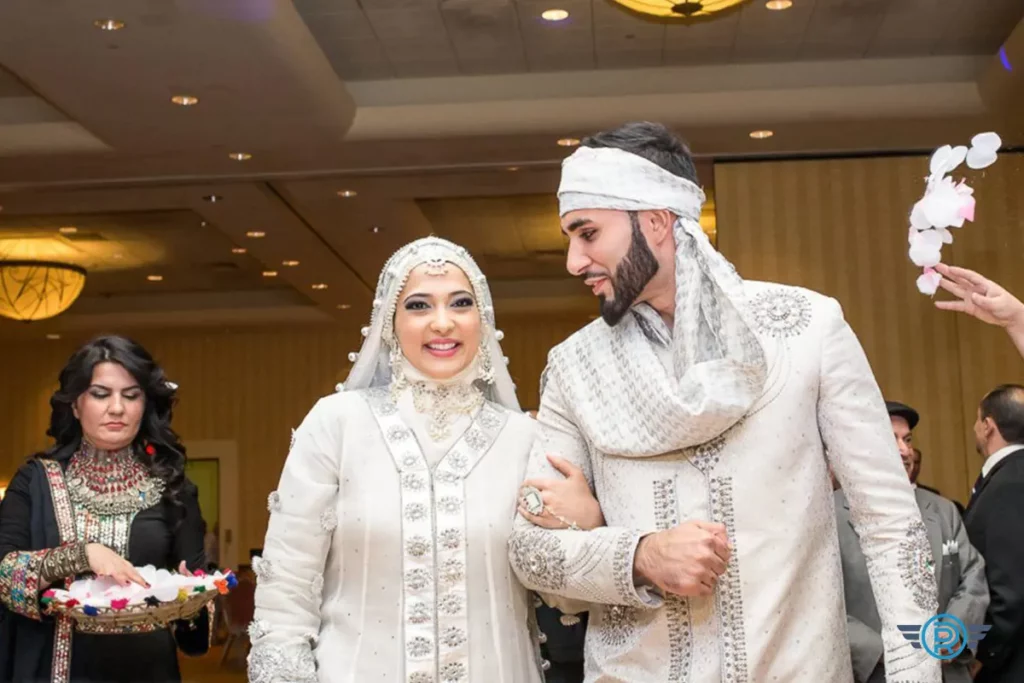
Groom’s Attire
Emirati grooms traditionally wear a “kandura,” a long, white robe made from soft, lightweight fabric. Over the kandura, a black or dark brown “abaya” is draped, adding formality and elegance to the groom’s appearance.
On the groom’s head, a “ghutra” or “keffiyeh” is worn, held in place with a black cord called the “agal.” This headwear signifies dignity, masculinity, and respect for cultural and religious traditions. Some grooms may wear uniquely tailored kanduras or ones in different shades like beige or tan for the wedding night.
Guest and Family Attire
At Emirati weddings, female guests also dress elegantly in decorated abayas paired with gold jewelry and full makeup. Some may wear traditional local dresses featuring bold embroidery. Male guests typically attend in white kanduras and ghutra head coverings, maintaining the cultural ambiance of the celebration.
The role of the family in marriage
In the culture of the United Arab Emirates, the family plays a vital and central role in the marriage process. Marriage in this society is not merely a personal bond between two individuals—it is considered a union between two families. From spouse selection to wedding ceremonies and even post-marriage life, the family’s involvement is active and decisive. This presence stems not only from tradition but also from the cultural emphasis on social unity and respect for elders.
Family’s Role in Spouse Selection
In most cases, family members—especially the groom’s mother or sister—are responsible for identifying and proposing suitable matches. They typically seek a bride with good morals, strong family background, adherence to tradition, and cultural compatibility. This approach is rooted in trust in the parents’ experience and insight, and remains one of the oldest marriage customs in Emirati society.
Support During Engagement and Marriage Contract
Families lead the formal discussions during the engagement phase, including negotiating the dowry, living arrangements, wedding date, and other important details. These talks are conducted respectfully and aim at mutual understanding between the two families. The marriage contract is also arranged with the presence of both families, in accordance with cultural and Islamic traditions.
Support During the Wedding Ceremony
Families are primarily responsible for organizing the wedding celebrations—from preparing the venue and inviting guests to arranging food, attire, and gifts for the bride and groom. Events such as Henna Night, family dinners, and welcoming the bride into her new home are also managed and overseen by both families.
Guidance and Support After Marriage
The family’s role does not end with the wedding. In the early years of marriage, couples often rely on their families for emotional support and advice. In Emirati culture, families aim to help their children maintain a stable marriage, and when conflicts arise, elders may step in with calm mediation to prevent separation.
Wedding ceremonies in Dubai
In Emirati society, wedding costs—especially in a modern city like Dubai—have become a major topic of discussion and concern. While marriage holds a sacred and honorable place in UAE culture, the traditional customs and ceremonies that accompany it can often lead to significant financial strain. This is especially true in Dubai, where high living standards and social expectations contribute to the growing expenses associated with weddings.
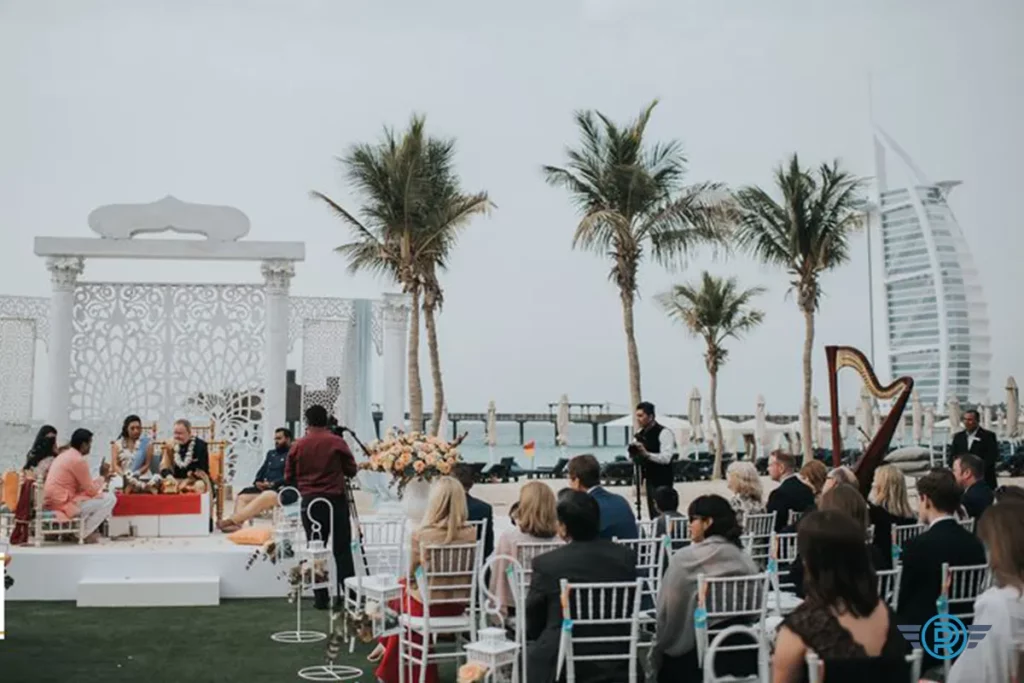
A large portion of the costs is tied to the engagement, wedding celebration, and the Henna Night. Renting luxurious halls, elaborate decorations, catering with both traditional and international dishes, live music or DJ performances, formal attire, and professional beauty services for the bride are among the primary expenses. These can sometimes total hundreds of thousands of dirhams, placing considerable financial pressure on families—particularly when multiple ceremonies like family dinners or bridal receptions are held.
In addition to the wedding festivities, the groom is often expected to provide an independent home, fully furnished with modern amenities. This expectation adds another layer of financial responsibility to the marriage process. Despite the heavy costs, many Emirati families strive to uphold cultural traditions and values during weddings.
In recent years, some couples have chosen to host simpler, more cost-effective weddings in an effort to maintain tradition while managing expenses. The government has also taken steps to support young couples by offering financial assistance and incentives, encouraging them to marry without bearing an overwhelming financial burden.
Expatriate marriage in Dubai
Due to the cultural diversity and multinational population of Dubai, immigrant marriages present a unique variation of the traditional Emirati wedding customs. As a global hub, Dubai hosts people from various Asian, European, African, and Arab countries, each bringing their own cultural and traditional wedding practices. This cultural diversity has made weddings in Dubai a fusion of different customs and modern innovations.
Immigrants generally strive to preserve their marriage rituals while adapting to local conditions. For instance, many Indian, Pakistani, or Filipino couples hold ceremonies featuring traditional clothing, foods, and customs, yet adjust some aspects of the event to comply with Dubai’s laws and social norms. Additionally, intercultural marriages, where the couple comes from different nationalities or religions, tend to lean towards simpler, blended ceremonies.
Moreover, the official and religious laws of the UAE play a significant role in immigrant marriages. Couples must complete legal procedures and documentation to have their marriage officially recognized. Overall, immigrant marriage customs in Dubai reflect cultural diversity and a harmonious balance between tradition and modernity, giving the city its unique global character.
Documents required for marriage in Dubai
For marriage in Dubai, complying with the laws and providing specific documents is essential to complete the official and legal process of marriage. These documents may vary slightly depending on the nationality and religion of the couple, but generally, the most important required documents within the framework of marriage customs and UAE laws are:
- Valid ID card or passport for both parties
- Certificate of no previous marriage or divorce/death certificate if previously married
- Recent passport-sized photos of the bride and groom
- Medical fitness certificate proving that the couple is physically healthy and free from contagious diseases (usually issued by authorized medical centers in Dubai)
- Parental consent if either party is below the legal marriage age
- Marriage contract or written agreement outlining conditions such as dowry, maintenance, and other legal matters (mostly required for Islamic marriages)
- For expatriates, documents proving legal residency in the UAE and sometimes official translations of identification documents are also mandatory
With these documents, couples can visit marriage registration offices or Sharia courts to complete the legal marriage procedures. Paying attention to these documents and following the proper steps is part of the official marriage customs in Dubai and guarantees the legal and formal registration of the marital union.
final word
Marriage in Dubai and Emirati culture goes beyond a simple ceremony; it represents a deep bond between two individuals and two families, carried out with respect for traditions and cultural values. Despite the influences of modernity and the cultural diversity brought by migration, marriage customs still hold a special place in society, striving to balance preserving traditions with embracing new changes.
Costs and legal documents are part of the marriage process in Dubai that must be carefully and respectfully observed according to laws and culture. Overall, marriage in Dubai symbolizes family solidarity, mutual respect, and cultural connection, laying the foundation for a shared life and creating a stable future for coming generations.





















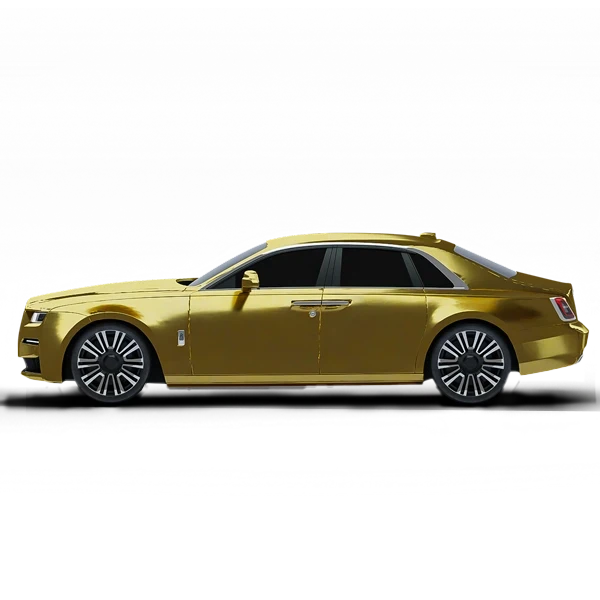







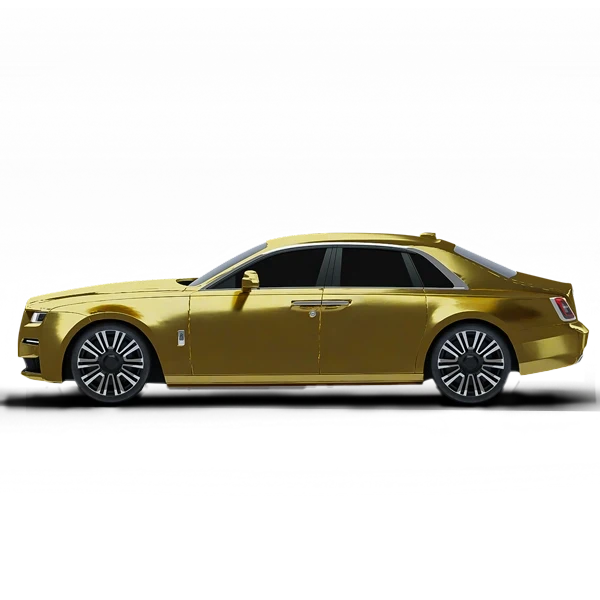






 Rolls Royce
Rolls Royce Lexus
Lexus Lamborghini
Lamborghini Porsche
Porsche Ferrari
Ferrari Toyota
Toyota Mercedes Benz
Mercedes Benz BMW
BMW Land Rover
Land Rover Bentley
Bentley Nissan
Nissan Cadillac
Cadillac Audi
Audi Chevrolet
Chevrolet GMC
GMC Hyundai
Hyundai Kia
Kia Mazda
Mazda